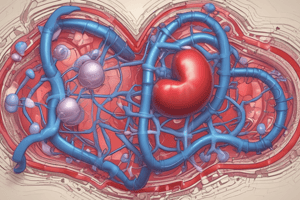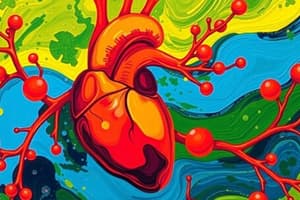Podcast
Questions and Answers
Which of the following best describes the effect of cardiac glycosides on the heart?
Which of the following best describes the effect of cardiac glycosides on the heart?
- They increase the output force of the heart and its rate of contractions. (correct)
- They only affect the rhythm of the heart.
- They have no significant effect on heart function.
- They decrease the heart rate and contractility.
Cardiac glycosides are ineffective in treating heart failure.
Cardiac glycosides are ineffective in treating heart failure.
False (B)
What are the two main groups of cardiac glycosides?
What are the two main groups of cardiac glycosides?
Cardenolides and Bufadienolides
The active ingredient in Digitalis purpurea is called __________.
The active ingredient in Digitalis purpurea is called __________.
Match the active ingredients to their scientific names:
Match the active ingredients to their scientific names:
Flashcards are hidden until you start studying
Study Notes
Cardiac Glycosides
- Cardiac glycosides are organic compounds that act on the sodium-potassium ATPase pump in heart cells.
- These compounds increase the output force and rate of contractions of the heart.
- They are used to treat heart failure and cardiac rhythm disorders.
Structure
- All cardiac glycosides share the basic steroidal nucleus, cyclopentaphenanthrene.
- This is a tetracyclic aromatic structure.
- It is composed of three fused benzene rings (phenanthrene) and a five-membered cyclopentane ring.
Classification
- Cardiac glycosides are divided into two groups:
- Cardenolides: contain a 5-membered unsaturated lactone ring at the C-17 position of the steroid nucleus.
- Examples include Digoxine from foxglove and Oliandrin from oleander or rosebay.
- Bufadienolides: contain a 6-membered lactone ring at the C-17 position of the steroid nucleus.
- An example is scillarenin, which is obtained from Squill (a rodenticide).
- Cardenolides: contain a 5-membered unsaturated lactone ring at the C-17 position of the steroid nucleus.
Key Structural Features
- C-17 Position: alpha or beta unsaturated lactone ring
- C-14 Position: OH
- Ring Junctions:
- AB ring is cis
- BC ring trans
- CD ring cis
- C-3 beta Position: sugar part (glucose –rhamnose –digitoxose)
Studying That Suits You
Use AI to generate personalized quizzes and flashcards to suit your learning preferences.




